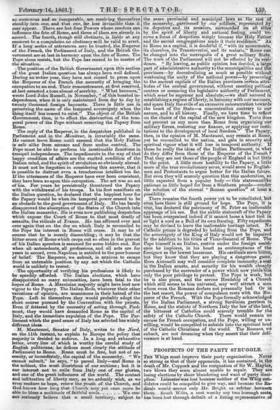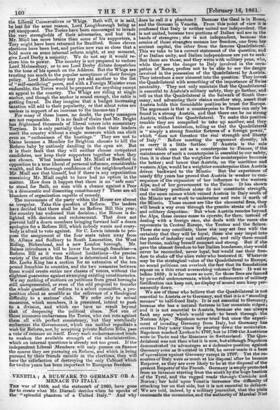PROSPECTS OF THE PARTY STRUGGLE.
TILE Whigs must improve their party organization. Never so strong as that of their opponents, it has sustained, in the death of Mr. Coppock and the resignation of Sir W. Hayter, two blows they seem almost unable to repair. They are losing elections by sheer blundering and want of party disci- pline. Leicester was lost because neither of the Whig can- didates could be compelled to give way, and because the Ra- dicals would accept only Mr. Bright as arbiter between them. 6otttli Wilts, a seat worthy any two borough seats, has been lost through default of a fitting representative of
the Liberal Conservatives or Whigs. Bath will, it is said, be lost for the same reason, Lord Loughborough being as yet unopposed. The Tories have been encouraged to invade the very strongholds of their adversaries, and but that Mr. Mill has more brains than some of his supporters, a Tory might have been returned for Bradford. Some eleven elections have been lost, and parties now run so close that a bold move on some internal reform might, at any moment, give Lord Derby a majority. We do not say it would re- store him to power. The country is not prepared to endure Lord Malmesbury, or to see Lord Derby dictate despatches in the tone of his speech on the Address. But the Whigs are trusting too much to the popular acceptance of their foreign policy. Lord Malmesbury may yet add another to the list of " self-sacrificing" peers, and with a Foreign Minister even endurable, the Tories would be prepared for anything except an appeal to the country. The Whigs are riding at single anchor, and though the anchor is sound enough, the cable is getting frayed. Do they imagine that a budget increasing taxation will add to their popularity, or that silent votes are useless in support of an increase to the income-tax ? For many of these losses, no doubt, the party managers are not responsible. It is no fault of theirs that Mr. Bright has frightened thousands of liberal voters into momentary Toryism. It is only partially their fault that their leaders meet the country without a single measure which can elicit even an "enthusiasm of the hustings." They are not to blame because a Member for Brighton chooses to kill the Reform baby by untimely dandling in the open air. But it is their fault that they will neither choose competent candidates, nor keep their supporters together when they are chosen. What business had Mr. Miall at Bradford in opposition to a true liberal of personal influence, considerable wealth, and the thorough confidence of the neighbourhood ? Mr. Miall saw that himself, but if there is any organization remaining Mr. Miall ought to have had no option in the matter. How does it happen that there is no "safe man" to stand for Bath, no man with a chance against a Peer in a democratic and dissenting constituency ? These are all blunders of organization capable of remedy.
The movements of the party within the House are almost as irregular. Take this question of Reform. The leaders have decided that there shall be no Reform Bill this year ; the country has endorsed that decision ; the House is de- lighted with decision and endorsement. That does not prevent half a dozen members bringing forward half a dozen apologies for a Reform Bill, which nobody wants and every- body is afraid to vote against. Sir C. Lewis intends to pro- pose the assignment of the four seats taken away from St. Albans and Sudbury to South Lancashire, the West Riding, Birkenhead, and a new London borough. Mr. Baines introduces a bill to lower the borough franchise—a Reform Bill as it were without limitations—the precise variety of the article the House is determined not to have. Mr. Locke King has a motion for an extension of the ten pound franchise to counties, and the two measures between them would create entire new classes of voters, without the slightest guarantee against swamping existing constituencies. We say nothing of motions on petitions from great boroughs still unrepresented, or even of the odd proposal to transfer the whole question of reform to a select committee, a pro- position about as sensible as the reference of a theological difficulty to a sextons' club. We refer only to actual measures, which members, it is presumed, intend to push to a division, and which can have no result beyond that of deepening the political chaos. Not one of these measures embarrasses the Tories, who can vote against them all with perfect consistency, but they wretchedly embarrass the Government, which can neither repudiate a wish for Reform, nor, by accepting private Reform Bills, pass a vote of censure on itself. Every such embarrassment tends to .weaken the available strength of the administration, which on internal questions is already not too great. If the independent Liberal Members will only pursue on finance the course they are pursuing on Reform, and which is being pursued by their friends outside in the elections, they will have the satisfaction of destroying the only Cabinet which for twelve years has been important to European freedom.































 Previous page
Previous page